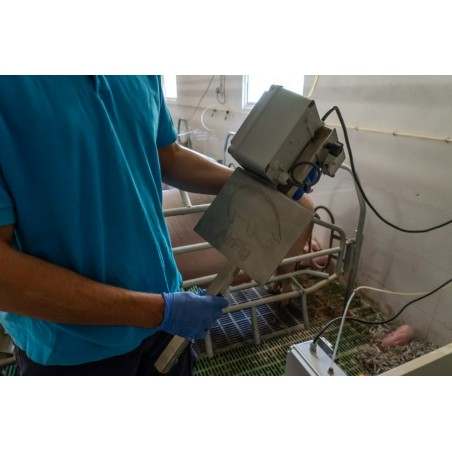An important approach to stabilize gut health of weaner pigs is the optimization of intestinal microbial colonization and the inclusion of dietary fiber is a promising strategy. This study aimed to investigate the effect of fiber-rich rye and rapeseed meal compared to wheat and soybean meal on fiber digestibility and the composition and metabolic activity of intestinal microbiota. At weaning, 88 piglets were allocated to four feeding groups: wheat/soybean meal, wheat/rapeseed meal, rye/soybean meal, and rye/rapeseed meal. Dietary inclusion level was 48% for rye and wheat, 25% for soybean meal, and 30% for rapeseed meal. Piglets were euthanized after 33 days for collection of digesta and feces. Samples were analyzed for dry matter and non-starch-polysaccharide digestibility, bacterial metabolites, and relative abundance of microbiota.
Rye-based diets had higher concentrations of soluble non-starch-polysaccharide than wheat-based diets. Rapeseed meal diets were higher in insoluble non-starch-polysaccharide compared to soybean meal. Rye-fed piglets showed a higher colonic and fecal digestibility of non-starch-polysaccharide. Rapeseed meal-fed piglets showed a lower colonic and fecal digestibility of non-starch-polysaccharide than soybean meal-fed piglets. Rye increased jejunal and colonic concentration of short-chain fatty acids compared to wheat. Rapeseed meal-fed pigs showed a lower jejunal concentration of short-chain fatty acids than soybean meal-fed pigs. Relative abundance of Firmicutes was higher and of Proteobacteria lower in rye-fed pigs compared to wheat. Rapeseed meal reduced Firmicutes and increased Actinobacteria (jejunum, colon, feces: jejunal Proteobacteria and colonic Bacteroidetes). Despite a similar composition of the colonic microbiota, the higher amount and solubility of non-starch-polysaccharide from rye resulted in an increased fermentative activity compared to wheat. The high amount of insoluble dietary fiber in rapeseed meal-based diets reduced bacterial metabolic activity and caused a shift toward insoluble fiber degrading bacteria.

Further research should focus on host–microbiota interaction to improve feeding concepts with a targeted use of dietary fiber.
Ellner C, Wessels AG, Zentek J. Effects of dietary cereal and protein source on fiber digestibility, composition, and metabolic activity of the intestinal microbiota in weaner piglets. Animals. 2022; 12(1): 109. https://doi.org/10.3390/ani12010109






